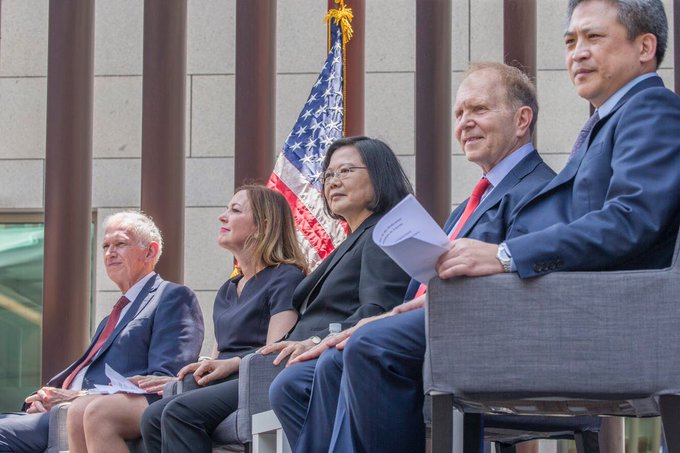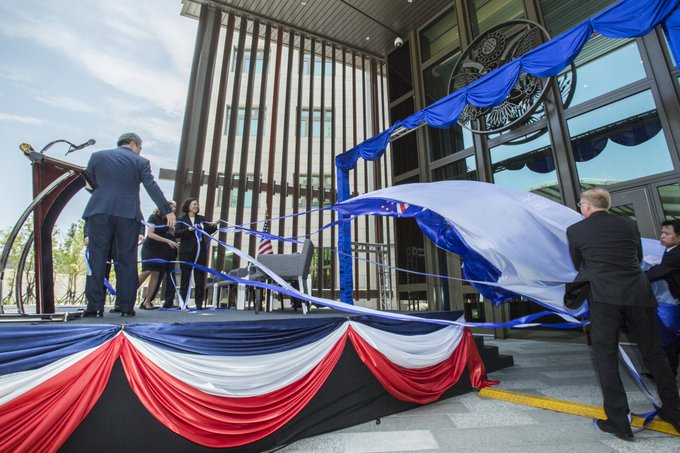By COLIN DWYER

Politicians and officials — including Taiwan's president, Tsai Ing-wen (center) — pose during the dedication ceremony Tuesday for the American Institute in Taiwan, the de facto U.S. Embassy in Taipei.
The same day that Trump and North Korean dictator Kim Jong Un held their historic summit in Singapore, several U.S. politicians and officials attended another, far less heralded ceremony just to the north: It was the dedication of a ritzy new complex for the American Institute in Taiwan, or AIT — and China wasn't happy about it.
That's because despite its innocuous name, the organization has long functioned as the de facto U.S. Embassy in Taiwan, the self-ruled island that Beijing considers a renegade Chinese province.
Since the U.S. established diplomatic ties with China nearly four decades ago, Washington has acknowledged that claim and cut ties with Taiwan — formally, at least.
Yet the U.S. and Taiwan have maintained a robust informal relationship.
And on Tuesday, the representative office that has handled many of those informal affairs got a roughly $256 million upgraded compound in Taiwan's capital, Taipei.
Taiwan's president, Tsai Ing-wen, told the crowd at the dedication ceremony that the building marks "a new chapter in a story that has been decades in the making."
"The friendship between Taiwan and the U.S. has never been more promising," Tsai said.
"The great story of Taiwan-U.S. relations remains to be filled with the efforts of those that will one day occupy this building."




Also in attendance were Rep. Gregg Harper and Marie Royce, the U.S. assistant secretary of state for educational and cultural affairs.
"We may be separated by a great ocean," Royce said in prepared remarks, "but our shared convictions, values, and trust form a strong foundation for cooperation across a range of issues." Chinese authorities made clear they did not share that sense of celebration, however.
Geng Shuang, spokesperson for the Chinese foreign ministry, said Tuesday that the US violates the one-China principle.
The "One China" policy Geng references was adopted by the U.S. in 1979.
The policy dictates that the U.S. formally recognize only one Chinese government — the Communist apparatus based in Beijing — and officially eschew relations with a Taiwanese government, which has proclaimed itself the "Republic of China."

Taiwan Scrambles Jets To Track Chinese Bomber Drills
Beijing has been exerting pressure on businesses and countries to officially consider Taiwan part of China — including successful efforts with certain airlines, Burkina Faso and the Dominican Republic, which cut ties with Taiwan earlier this year.
China also has recently pointedly conducted several military drills in the Taiwan strait and around the island.
Meanwhile, the AIT is happily plowing ahead with its big move.
The organization, which was first established in 1979 after the diplomatic shift, plans to officially relocate to the new facility this fall.
And AIT Director Kin Moy, for one, said Tuesday he eagerly welcomes this "testament to this friendship, to the U.S. commitment to Taiwan, and to our staying power in Taiwan."
"I offer you this," he said, "a tangible symbol that the United States is here to stay."
Aucun commentaire:
Enregistrer un commentaire